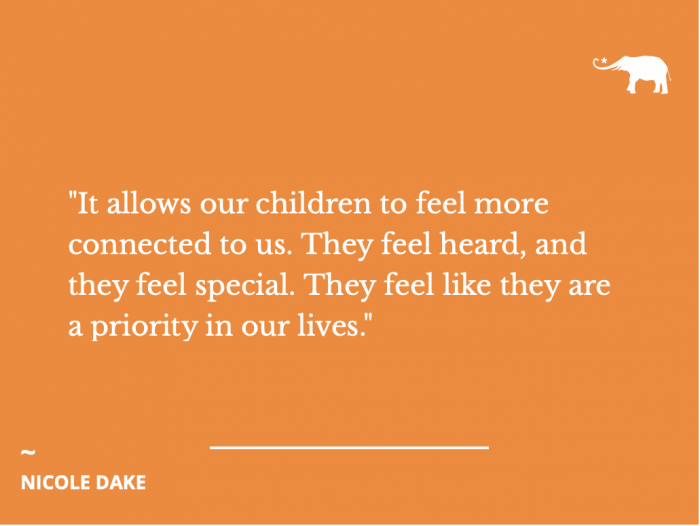One of kids’ love languages is “quality time.”
When we parent mindfully, we pay full attention to our kids whilst we are with them. That means not just being with them, but having a quality interaction with them.
A couple of years ago, I had my toddler yell at me, “Mom, put down your phone!” I had been playing an online game instead of playing with her. It made me realize that this tiny person was feeling like she was in second place to my phone and she was hurt by it.
We want to make our kids feel loved and prioritized, and it’s hurtful to realize that we’ve been damaging our relationship with them. From that point on, I’ve made sure to be off my phone when I am spending time with my kids, and if one of them comes to ask me something, I put my phone down and give them my full attention.
In addition to damaging our relationship with our child, being on the phone all the time can hurt their development. According to Concordia University, Nebraska:
“Before parents should be concerned about their children’s smartphone usage, they should first consider their own. As the ultimate examples of their children, parents need to be mindful of their smartphone consumption since that kind of behavior will set the stage for how children will interact with technology. Parents must consider what image they express to their children and how they communicate responsible smartphone consumption.”
When kids are on smartphones too much as babies and toddlers, it can lead to aggressive behaviors in school, as well as physical health issues. Kids mirror us. When we are on phones too much, they are likely to do the same. Similarly, when we have kids begging us to put the phone down and listen, we really need to be sure we are doing that.
Learning to practice mindfulness in all aspects of life, but particularly with parenting, can counteract our busy culture of being on the phone all the time. The basics of mindfulness include: not judging, nor striving, having patience, adopting a “beginner’s mind,” trusting, accepting, and letting go.
The idea of “beginner’s mind,” which can also be referred to as being mindfully present, is being in the moment and paying attention only to what is actually going on around us without worrying about the future or the past. To practice “beginner’s mind” is to see the world as a child sees it, or as if seeing it for the first time, and experiencing everything with wonder. How much better would it be to connect with our children while looking at the world with wonder as they do, instead of thinking in the back of our mind about our to-do list?
I believe that transformational listening, though not an aspect of mindfulness, per se, has helped me to be mindfully present with my kids—which is incredibly helpful for my relationship with them.
Last year I took a class with Robin Denise Johnson, PhD that dealt heavily with transformational listening, and I learned how much it can truly transform our life when we listen with an open heart. Since I was on work from home when I took the class, I tried practicing all the new listening skills that I learned with my kids. It was really helpful for me to learn to listen to them attentively, without any devices in front of me.
According to Dr. Johnson:
“Transformational listening demonstrates respect behaviorally, helps you collaborate, builds trust, balances extraversion-introversion and direct-indirect communication styles, and is one of the most powerful competencies in the multicultural leader’s toolkit.”
I believe the key thing for parents to keep in mind is that listening to our children is important. When we listen with an open heart, our kids feel trusted and safe, which helps them to open up. Although this is important at every age, it can be especially important with teens who often shut their parents out. Building a foundation of trust with them from a young age allows them to come to us when they are struggling, and to know we will help without judgement.
Being a mindful parent is being mindfully present with our kids and being fully immersed in our experience with them. This allows us to make the time that we spend with them “quality time.”
When we parent mindfully, it allows our children to feel more connected to us. They feel heard, and they feel special. They feel like they are a priority in our lives because we are willing to put down what we are doing in order to pay them our full attention. There are also huge benefits to our children’s health and self-esteem when we parent them with mindful attention—and it opens the door for them to welcome learning from us.
According to the Child Mind Institute, the main things that are important for mindful parenting are slowing down and paying attention to our children’s needs. Mindfulness can reduce stress, so as well as benefitting our children, this also benefits us by creating a calm and less stressed environment in our home.
When we parent mindfully, focus on the present moment, stop worrying about the past or the future, take ourselves away from screens, and immerse ourselves in being with our kids, we can be more playful and have more fun too. Children are happy and creative by nature, and taking some of that for ourselves can really help us in addition to them. When we are fully immersed in the present moment, we can experience more joy and playfulness, the way that small children already do.
We can learn from our kids through mindfulness.
Playing with our kids and enjoying the time we spend with them can do so much to enrich our lives. So, put away your phone, be present, practice transformational listening, and start parenting mindfully.












Read 0 comments and reply